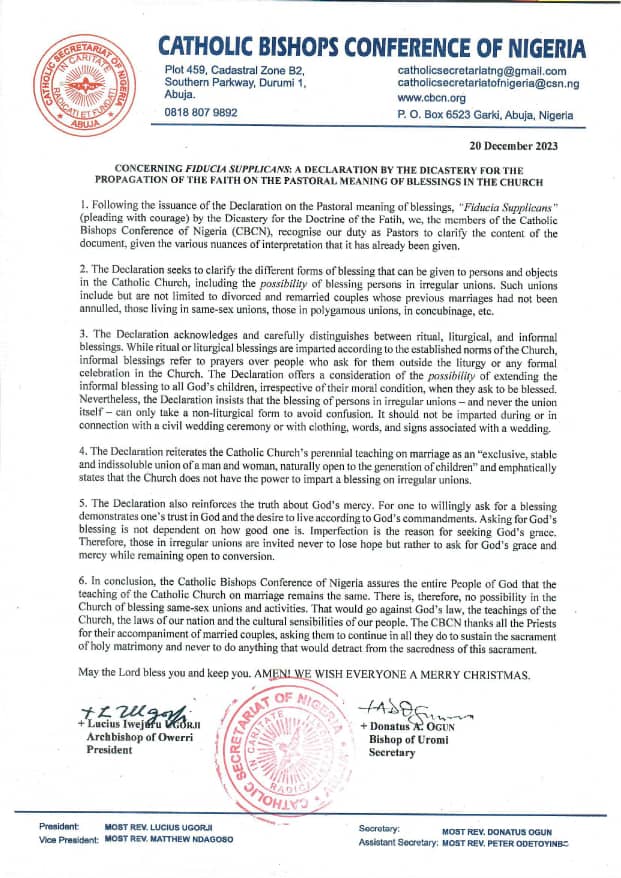- Analysts question when polygamy will attract similar sympathy and blessings
Nigeria’s Catholic Bishops Conference has announced that contrary to interpretations given to the recent declaration of the Pope, same-sex marriage still goes against the Church’s teaching.
In a statement signed by President of the Catholic Bishops Conference of Nigeria, Lucius Ugirji and Secretary, Donayus Ogun on Wednesday, the bishops said that the declaration recently made by Pope Francis allowing priests to bless same-sex couples is not the same as blessing same-sex marriages.
But analysts are also questioning why the same sympathies have not been extended to polygamy which the church has condemned over the years. Many contend that it is hypocritical of the church which has punished many of its members, relived several off important duties in the church and denied them holy communion for being in polygamous marriages between persons of the opposite sex yet sympathetic towards gay relationships and ambivalent about its true position on gay marriages.
Alfred Ekwo who spoke with Law & Society said: “Do people in polygamous marriages which is even between men and women not deserve blessings too? The Catholic church has treated people in polygamous relationships as if they have committed the worst sin. I hope the Pope will make a declaration too about polygamy which is part of our culture in Africa.”
Making clarifications on the controversial declaration attributed to the Pope however, the Catholic Bishops Conference of Nigeria assured “the entire People of God that the teaching of the Catholic Church on marriage remains the same.
“There is, therefore, no possibility in the Church of blessing same-sex unions and activities. That would go against God’s law, the teachings of the Church, the laws of our nation and the cultural sensibilities of our people.
“The CBCN thanks all the Priests for their accompaniment of married couples, asking them to continue in all they do to sustain the sacrament of holy matrimony and never to do anything that would detract from the sacredness of this sacrament.”
Throwing more light on how blessings work in the Catholic Church, the conference said, “Following the issuance of the Declaration on the Pastoral meaning of blessings, “Fiducia Supplicans” (pleading with courage) by the Dicastery for the Doctrine of the Faith, we, the members of the Catholic Bishops Conference of Nigeria (CBCN), recognise our duty as Pastors to clarify the content of the document, given the various nuances of interpretation that it has already been given.
“The Declaration seeks to clarify the different forms of blessing that can be given to persons and objects in the Catholic Church, including the possibility of blessing persons in irregular unions. Such unions include but are not limited to divorced and remarried couples whose previous marriages had not been annulled, those living in same-sex unions, those in polygamous unions, in concubinage, etc.
“The Declaration acknowledges and carefully distinguishes between ritual, liturgical, and informal blessings. While ritual or liturgical blessings are imparted according to the established norms of the Church, informal blessings refer to prayers over people who ask for them outside the liturgy or any formal celebration in the Church.
“The Declaration offers a consideration of the possibility of extending the informal blessing to all God’s children, irrespective of their moral condition, when they ask to be blessed. Nevertheless, the Declaration insists that the blessing of persons in irregular unions and never the union. itself can only take a non-liturgical form to avoid confusion. It should not be imparted during or in connection with a civil wedding ceremony or with clothing, words, and signs associated with a wedding.
“The Declaration reiterates the Catholic Church’s perennial teaching on marriage as an “exclusive, stable and indissoluble union of a man and woman, naturally open to the generation of children” and emphatically states that the Church does not have the power to impart a blessing on irregular unions.
“The Declaration also reinforces the truth about God’s mercy. For one to willingly ask for a blessing demonstrates one’s trust in God and the desire to live according to God’s commandments. Asking for God’s blessing is not dependent on how good one is. Imperfection is the reason for seeking God’s grace. Therefore, those in irregular unions are invited never to lose hope but rather to ask for God’s grace and mercy while remaining open to conversion.”






